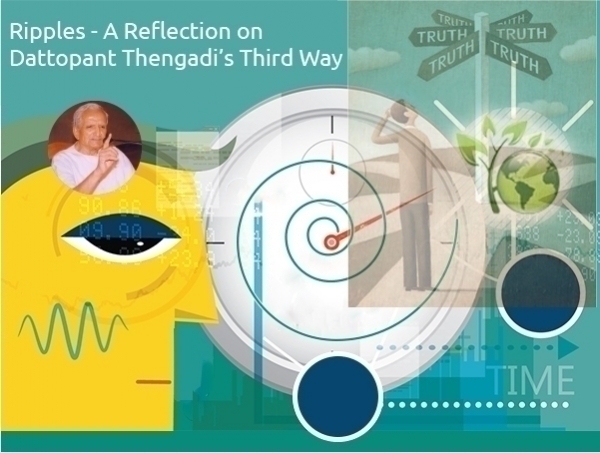Ripples A Reflection On Dattopant Thengadi's Third Way - Part 29
Dattopant had already stated in the address that necessary changes are to be brought to the legal system, the constitution, institutional framework" and the most important is the mindset of people.
Total Views |
I have been reflecting in my own way on Dattopant Thengadi Ji's Third Way. I present these small "ripples" that it has caused in my mind in a series. I am glad it has found its resonance in many thinking minds alike. I hope the readers have read the earlier article in the series before moving ahead.

Also Read: Ripples A Reflection On Dattopant Thengadi's Third Way - Part 28
(The paper read on 4'th of June 1994,in continuation of the address to Adhivakta Parishad 7'th September 1992)
Dattopant had already stated in the address that necessary changes are to be brought to the legal system, the constitution, institutional framework' and the most important is the mindset of people. The Parishad, he envisioned should be ' the nucleus of the constituent assembly'.
He further raised two points.
1) the constitution needs to be based on our ethos, it need not be created by the government.
2) The political parties are instruments , their role is to be evaluated. A suitable constitution and other institutional framework is to be evolved.
To clarify his points he refers to some opinions without any comments.
1) Dr. Ambedkar thought the future amendments if introduced by political parties to overcome some barriers then one can describe this as motivated act ( probably). Originally the constituent assembly had no motive attached. Constitution, if doesn't work satisfactorily then men are to be blamed. He clearly mentioned that no state can ' secede from the Union'. Of course, he warned that the society ought to work on inequality or it would ruin the things which are built up with great efforts. Power if becomes a monopoly of a few, would result into isolation, exclusiveness and anti social spirit. The basis of constitution should be social democracy and the values of equality, liberty and fraternity.
2) Pandit Nehru described it as a 'toned down and unlike all parties conference'.( At least some congress leaders described it this way.) Some arrangements were made to see that all the provinces get representation but adult franchise was not the procedure. All communities were represented. Initially little more than 3/4 were elected on congress votes, a little less than 1/4 represented the states and the rest were eminent personalities. (The paper gave a detail description of this.)After the partition the total number of member was reduced. ( Muslim league refused to participate in the constituent assembly before the partition too.) The rest of the numbers too changed but the nature was similar to the original idea. (As we all are aware the words 'Secular and Socialist' were added to the preamble in 1977)
3) Loknayak Jayprakash Narayan ji while raising points of concern stated that it was unsatisfactory document and it could neither garuntee the freedom nor the social change. He thought the members are to be elected by people as it would represent the people and thus will have people interested in the process. The provinces had a little representation, he criticised the procedure too. The members did not really represent the states reducing the body into utterly unrepresentative one. So a new body ought to be elected according to him.
4) Dr Sachchidanand Sinha warned that the institutions perish when 'wise are banished from public councils' ,as they try to be honest and other use honeyed words and ultimately betray people.
5) Dr Rajendra Prasad thought the label is not important as long as it serves the purpose. Some defects are bound to be a part of it as we don't have any norm to measure moral qualities of members. He wanted it to be drafted in an Indian language.
There are many things borrowed from western countries. But the political and social past of our nation is neglected and discarded ( probably).
6) There are concepts like village panchayat and decentralisation needed attention according to Mahatma Gandhi ji. It was inserted in the draft among 'Directive Principles Of State Policies'. In a way the constitution did not reflect Bharatiya 'mind, temperament, traditions and culture'.
7) P Koteswara Rao a constitutional expert felt that the 'constitution is neither Indian nor Gandhian'.
Dr Ambedkar had to accommodate many views which at times were contrary to his views as the set up was a democratic one. Probably he was sceptical whether it would protect the interests of the 'downtrodden'.

